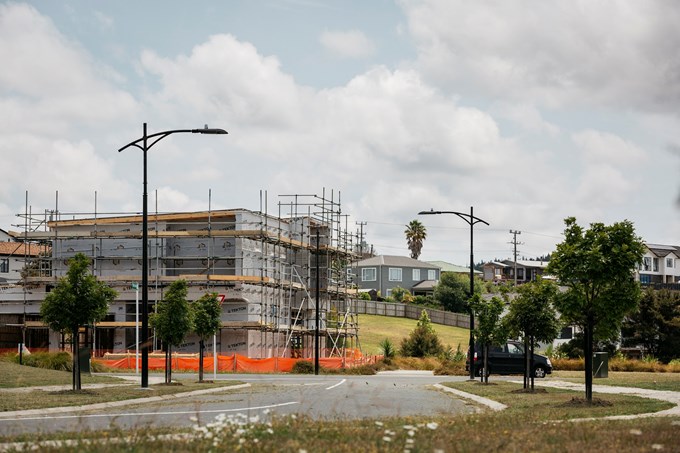With building consent numbers at an all-time high, Auckland Council is looking to new online tools and services to help manage increases in service demands and maintain its record-breaking building consent activity.
Auckland’s building boom is driving the highest consents demands in decades. Each week the council completes around 400 building consents for new residential, renovations and commercial builds, 330 code compliance certificates and 4,500 building inspections.
This coincides with record highs for new homes consented with 17,500 in Auckland in the 12 months to March 2021 – up 17 per cent on last year, according to the latest Stats NZ figures.
To accommodate the city’s strong growth, consents activity shows the major shift continues to more high-density housing, such as apartments and townhouses. In 2021 to date, 62 per cent of new homes consented have been multi-storey homes, compared to 45 per cent in 2017.
Craig Hobbs, Director Regulatory Services, says Auckland Council is continually looking to improve its consenting processes to stay on top of these demand challenges, including new ways to use online tools and service improvements.
“Building industry forecasts are pointing to continued growth through 2021 and well into 2022, so we’re expecting high demands on council services to continue over this period.
“Multi-storey townhouse and apartment housing is now way more than half of all new housing in Auckland, creating issues you don’t get with a single-storey house.
“It means a significant increase in the number of housing units included in each consent application and a greater range of complex technical considerations.
“The higher the building, the more it takes to keep people safe. For example, there are more complex technical and safety issues, such as noise, fire, structural design, and geotechnical issues. These consents are complicated and take longer to consent and more expertise is needed to process them,” says Mr Hobbs.
Responding to demand challenges
The council completes up to 1000 building inspections each day. Last month changes were made to our online bookings system for building inspections, limiting the number of bookings for any given consent in a four-week period to four visits.
This is to help prevent the increasingly common practice of people booking the same inspection on multiple days due to uncertainty as to when their work would be ready or to allow for a re-inspection if their first inspection failed. In some cases, up to 40 inspections were being booked for a standard house project which only required 12 to 15 inspections.
The excess booking behaviour was causing 300 cancellations every day, clogging the online system, and driving up inspection wait times.
“When bookings are cancelled on the day, it requires a lot of manual intervention to fill the spots with future booked inspections for developments that are ready,” says Craig Hobbs.
“To help ease demand pressures, we have increased our numbers of building inspectors with around 25 new inspectors having begun work in March and April.
“We have also been encouraging builders who perform large volumes of building work to make use of an online construction quality assurance tool called Artisan, which we’re looking to roll out more broadly to selected quality builders.
“This tool, developed by BRANZ with input from Auckland Council, supports builders in better managing the quality of work on site. It also supports remote inspections with our building inspectors being able to utilise the record of works captured in the system instead of an on-site inspection,” he says.
Artisan allows builders to collect photos in an inspection checklist form and submit that online to the council for review. The photo checklist can be done any time by builders onsite.
A building inspector then reviews the photo checklist and provides a pass or fail result dependent on the findings. Experience to date shows that, while the process takes about as long as a normal inspection, the fail rate is a lot less because builders can use the checklist to do quality assurance on their work before submitting to the council.
“We’re asking builders and people doing building works to check that their work is complete before their inspections take place to avoid unnecessary fails,” says Craig Hobbs.
“It also goes a long way to speeding up the consents process if people submit quality and complete building consent and code compliance certificate applications. We receive far too many that are poor quality and incomplete, which causes delays while we seek further information from applicants.
“Like other councils across New Zealand, we must adjust to changing circumstances and challenges, and we operate within a competitive market for specialist building consent staff. However, as we continue responding to rapid growth over the next 12 months, we’re confident our ongoing system and process improvements will see us maintain our record levels of service.”
Tips to help your consent application
- Ensure your building consent or code compliance certificate application is complete and of high quality before submitting so it can be processed without delays. We have advice available on the council’s website here.
- Only book the building inspection you need – we recommend booking one inspection and, if needed, one additional inspection as a back-up.
- Check your building works are complete and ready before inspections take place to avoid unnecessary fails.
- If you are working on a multi-unit development, such as apartments or townhouses, then you can apply for a Master and Dependent Building Consent. This allows four inspections to be booked at any time for each housing unit.
- If you are intending to construct a commercial building or a multi-level residential building of three storeys or more, make sure you book a pre-construction meeting before you begin work. We can discuss how we can utilise a construction quality assurance system to reduce reliance on building inspections.


